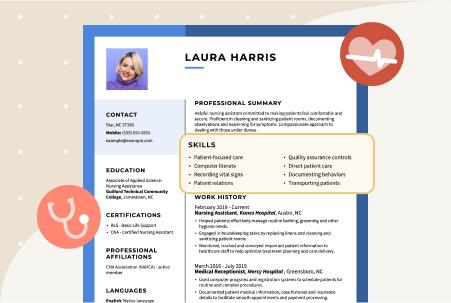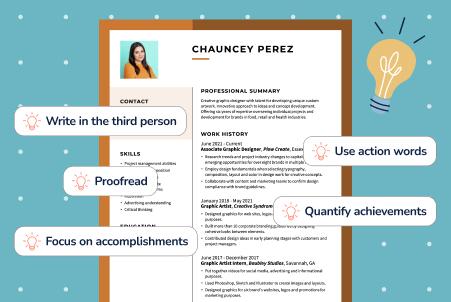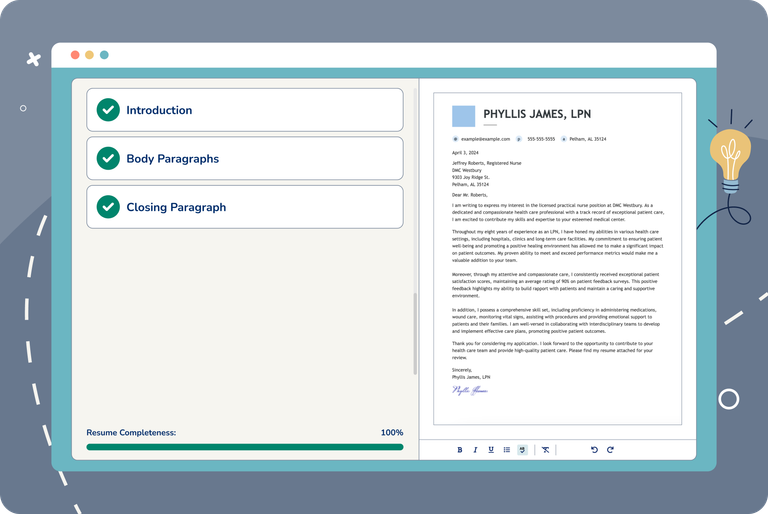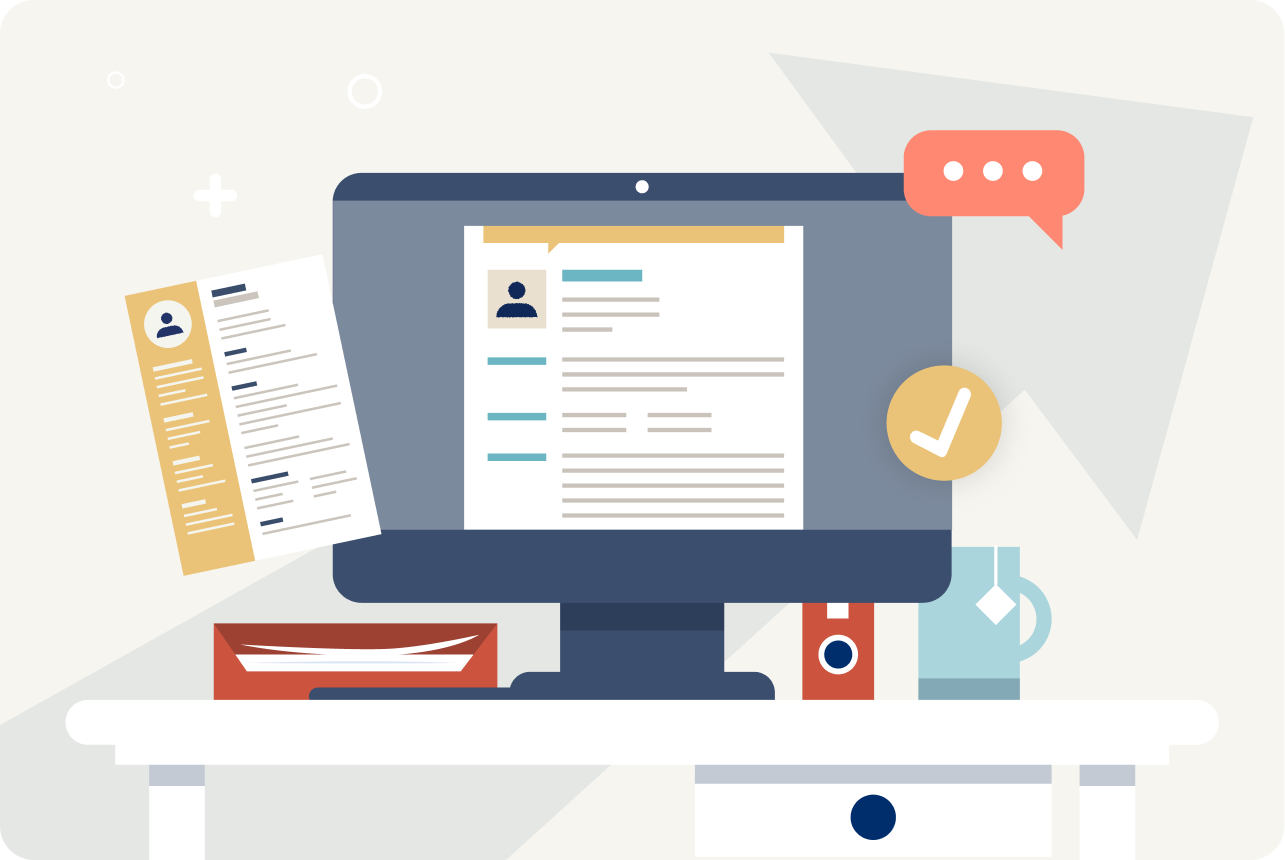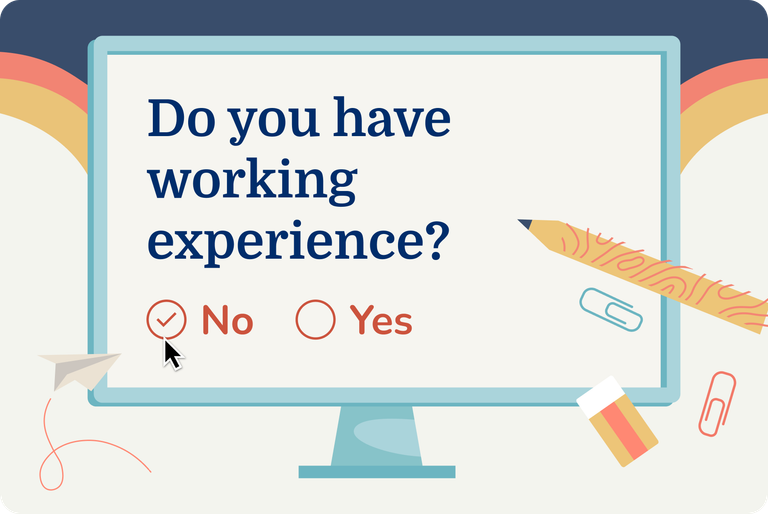Healthcare Skills for a Resume (Examples & Tips)
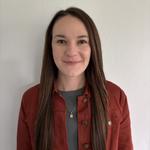
Our customers have been hired at: *Foot Note
AI Resume Skills Generator
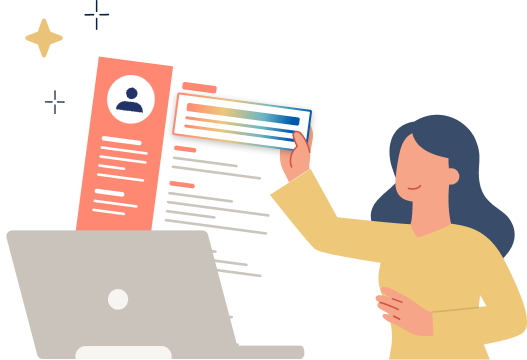
Healthcare professionals are pivotal in shaping the wellness landscape by tending to patients’ physical and mental well-being. They act as caregivers, advisors, and coordinators by cultivating environments that prioritize patient care, evidence-based practices, and continuous improvement. The healthcare industry offers diverse roles and responsibilities, including physicians, nurses, therapists, technicians, and administrators.
According to projections by the US Bureau of Labor Statistics, employment opportunities in healthcare are expected to grow faster than average, with about 1.8 million openings expected each year through 2032. Securing one of these positions requires crafting an outstanding resume and cover letter and possessing the requisite skills and qualifications for the specific role. You’ll need the right healthcare skills and an impressive resume to beat the competition and land your dream job. Read our comprehensive guide, How to Write a Resume for tips.
Table of Contents
Get started with MyPerfectResume today!
- Build a resume on any device
- Pick an ATS-friendly template
- Tailor with AI copy suggestions
Make a resume with MyPerfectResume
Our Resume builder can help you write the perfect resume. Start Now!
What are healthcare skills?
Healthcare skills encompass a broad range of abilities essential for delivering effective patient care and working efficiently in medical environments. These skills include clinical competencies such as patient assessment, medication administration, and use of medical equipment, as well as soft skills like communication, empathy, and problem-solving.
Proficiency in electronic health records (EHR) management, teamwork, and adherence to ethical and safety standards are also critical. Together, these skills ensure that healthcare professionals can provide high-quality care, collaborate effectively with other team members, and respond adeptly to patients' needs.
Examples of healthcare skills
Hard skills
Hard skills are practical, job-specific abilities that can be learned and measured. Healthcare workers use a variety of hard skills to function well in their roles.
Examples of hard healthcare skills include:
- Medical terminology
- Patient assessment
- Medication administration
- Diagnostic procedures
- Intravenous therapy
- Wound care
- Surgical assistance
- Electronic medical records
- Life support techniques
- Patient education
Soft skills
Healthcare workers rely on soft skills to build trusting relationships with patients, understand their needs, and address their concerns.
Here are 10 soft skills for healthcare workers:
- Therapeutic communication
- Time management
- Attention to detail
- Self-motivation
- Problem-solving
- Analytical skills
- Professionalism
- Flexibility
- Cultural sensitivity
Technical skills
Technical skills are vital to the healthcare industry because they help healthcare workers assess conditions accurately, make informed clinical decisions and provide appropriate interventions.
Technical healthcare skills include:
- Electronic health records (EHR) management
- Medical coding and billing
- Phlebotomy
- Patient monitoring
- Vital signs assessment
- Medication administration and dosage calculation
- Diagnostic imaging
- Sterile technique and infection control
- Advanced cardiac life support (ACLS)
- Medical equipment operation and maintenance
Interpersonal skills
Interpersonal skills are vital for healthcare workers because they are the foundation of effective patient care.
Key interpersonal healthcare skills include:
- Active listening
- Patient advocacy
- Verbal and written communication
- Conflict resolution
- Collaboration
- Boundary setting
- Empathy
- Trustworthiness
- Leadership
- Respect
Transferable skills
Transferable skills can be applied across different industries and jobs. They are valuable in the healthcare industry because they make you versatile and adaptable.
Here are ten important transferable healthcare skills:
- Prioritization
- Ethics
- Adaptability
- Organization
- Digital literacy
- Resilience
- Decision making
- Critical thinking
- Stress management
- Emotional intelligence
How to improve your healthcare skills
Continuously honing your healthcare skills is essential to ensuring the well-being and recovery of patients who rely on you.
Here are some tips for developing your skills:
- Get skill-specific training. There are many training and certification programs available for all healthcare specialties.
- Stay current with industry trends. Potential employees want to know you are up to date on healthcare regulations, policies and guidelines.
- Find mentors: Connect with healthcare professionals in your specialty to learn from their expertise.
- Be a perpetual student: Read healthcare industry journals, attend conferences and take courses to learn the latest tools and technologies in the industry.
- Network: Team up with healthcare professionals in different specialties to exchange perspectives and insights into patient care.
- Get hands-on experience: Internships, clinical rotations, community service and volunteer work are great ways to learn and enhance healthcare skills.
- Take care of yourself. Self-care will prevent burnout and enhance your ability to care for others.
How to highlight healthcare skills on your resume
Be thoughtful and deliberate when adding healthcare skills to your resume. Create a dedicated section to display your skills and include various job-relevant skills throughout your resume to make a stronger impact.
Here’s how to display your healthcare skills in your resume in six steps:
- First, choose the best resume format for your experience level and goals.
- Next, choose a professional resume template to ensure your resume is formatted correctly and polished.
- Review the job description and match your healthcare skills and accomplishments to the job requirements.
- Write a professional summary or resume objective highlighting two or three key healthcare skills.
- Use your work history section to emphasize your previous work accomplishments. For example, “Implemented new patient care protocols, resulting in a 30% decrease in hospital-acquired infections within six months, as validated by quarterly infection control audits."
- Create a skills section and add five to ten required healthcare skills.
Pro tip: Use keywords from the job description to create a targeted resume.
Common tools and technologies used in healthcare
Modern medical tools and technologies are pivotal for improving patient care, streamlining collaboration between healthcare teams, improving clinical workflow efficiency, and ensuring accuracy in healthcare.
Here are some useful tools and technologies you might consider adding to your healthcare skillset.
- Electronic health records (EHR) systems: Software platforms for storing, managing, and accessing patient health information electronically.
- Medical imaging devices such as X-ray machines, MRI scanners, CT scanners, and ultrasound machines for visualizing internal body structures to aid in diagnosis and treatment.
- Telemedicine platforms enable remote healthcare delivery and virtual consultations between patients and healthcare providers using video conferencing and other communication tools.
- Wearable health monitors such as fitness trackers, smartwatches, and wearable biosensors monitor vital signs, physical activity, and other health metrics for personal health tracking and remote patient monitoring.
- Clinical decision support systems (CDSS) are software tools that assist healthcare providers in making evidence-based clinical decisions by providing patient-specific information, guidelines, and recommendations.
- Electronic prescribing (e-prescribing) systems are digital platforms for generating and transmitting electronic prescriptions to pharmacies, improving accuracy, efficiency and safety in medication management.
- Health information exchange (HIE) networks are infrastructure for securely sharing and exchanging patient health information among healthcare organizations and systems to facilitate coordinated care and interoperability.
- Robotic surgery systems, such as advanced robotic-assisted surgical systems, enable surgeons to perform minimally invasive procedures with enhanced precision, dexterity and control.
- Patient portals are online platforms that allow patients to access their medical records, schedule appointments, communicate with healthcare providers, and manage their health information securely.
- Health monitoring software monitors and analyzes population health trends, disease outbreaks, and healthcare quality metrics to inform public health initiatives and policy decisions.
Best healthcare certifications
A certification in your specialty can help improve your healthcare skills and demonstrate your expertise.
Here are five certifications to advance your healthcare skills:
- Basic Life Support (BLS) Certification
- Advanced Cardiovascular Life Support (ACLS) Certification
- Pediatric Advanced Life Support (PALS) Certification
- Certified Nursing Assistant (CNA) Certification
- Registered Nurse (RN) Licensure
Key takeaways
Before you leave this guide to healthcare skills for a resume, remember these key points:
- The healthcare industry relies on workers with a diverse range of skills, from leadership and empathy to patient assessment and advanced cardiac life support.
- Certifications in healthcare can help you make the best possible impression on employers and can help you land your dream job.
- Add healthcare skills throughout your resume to make the best impact.
- When adding healthcare skills to your work history section, include measurable accomplishments that demonstrate what you can do with them.
- Display your healthcare skills throughout your resume for the biggest impact.
- Customize your healthcare resume to the specific job you are applying to.
FAQ
What are essential healthcare skills to include on my resume?
Essential healthcare skills to include on your resume may vary depending on your role. Some examples include clinical skills such as patient assessment and medication administration, communication skills, teamwork, attention to detail, problem-solving and empathy.
How can I showcase my healthcare skills effectively on my resume?
Use action verbs to describe your accomplishments, quantify your achievements and tailor your resume to the job description to highlight relevant skills and experiences.
What should I include in my healthcare resume's education section?
In your healthcare resume’s education section, include your highest degree and any relevant certifications, specifying the institution, location, and graduation date. List any specialized coursework or training pertinent to the role you’re applying for, and mention certifications like BLS, ACLS, or specialized nursing credentials if applicable. Ensure to highlight any honors or distinctions if relevant, and if you have multiple degrees or certifications, present them in reverse chronological order to showcase the most recent and relevant qualifications first.
For example,
How do I address an employment gap in my healthcare resume?
Address an employment gap in your healthcare resume by being honest about it and using a functional resume formatto focus on skills and accomplishments rather than chronological work history. Highlight any relevant volunteer work, continuing education, or skills development during the gap period.
What is the best way to format a healthcare cover letter?
The best way to format a healthcare cover letter is to include your contact information and the employer’s contact information, a greeting, an introduction stating the position you’re applying for, body paragraphs highlighting your qualifications and experiences, and a closing paragraph expressing your enthusiasm and gratitude.
How can I tailor my healthcare cover letter to a specific job posting?
Tailor your healthcare cover letter to a specific job posting by addressing the employer’s needs and requirements listed in the job description. Highlight the relevant skills, experiences and accomplishments that align with the job qualifications and express your genuine interest in the position and organization.
Should I include references in my healthcare resume or cover letter?
We do not recommend that you include professional references in your healthcare resume or cover letter; this is generally unnecessary. Instead, create a separate document with a list of professional references you can provide upon request. Ensure that your references are individuals who can speak positively about your work ethic, skills, and character.
How do I demonstrate my passion for healthcare in my cover letter?
In your cover letter, demonstrate your passion for healthcare by sharing personal anecdotes or experiences that inspired your career choice, discussing your commitment to patient care and advocacy, and highlighting any relevant volunteer work, extracurricular activities, or professional memberships related to healthcare.
What should I do after submitting my healthcare resume and cover letter?
After submitting your healthcare resume and cover letter, follow up with a thank-you email expressing your gratitude for the opportunity to apply and reiterating your interest in the position. Be proactive in checking for updates on your application status and be prepared to respond promptly to any requests for interviews or additional information.
How can I ensure my healthcare resume is ATS-friendly?
To ensure your healthcare resume is ATS-friendly:
- Use a simple resume template with standard fonts and minimal formatting with standard section headings and job titles, an optimized file format (such as .docx or .pdf) and spell out acronyms.
- Proofread your resume carefully.
- Avoid graphics, photographs and images.
- Use keywords from the job description.
- Use an ATS compatibility checker.
Our customers have been hired at:*Foot Note
